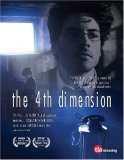| Reviews & Columns |
|
Reviews DVD TV on DVD Blu-ray 4K UHD International DVDs In Theaters Reviews by Studio Video Games Features Collector Series DVDs Easter Egg Database Interviews DVD Talk Radio Feature Articles Columns Anime Talk DVD Savant Horror DVDs The M.O.D. Squad Art House HD Talk Silent DVD
|
DVD Talk Forum |
|
|
| Resources |
|
DVD Price Search Customer Service #'s RCE Info Links |
|
Columns
|
|
|
the 4th dimension
The Movie
When this low-budget mind-bender opens, we are slowly drifting up and away from the figure of Jack Emitni (Louis Morabito), who lies asleep in a snow ditch. His narration quickly informs us that he's obsessed with time (his last name is conveniently an anagram for "in time"), which we can perceive but not control--we can only pass through it, at one constant rate, in one single direction. Get out your thinking caps, folks, cause this is gonna be one of those movies.
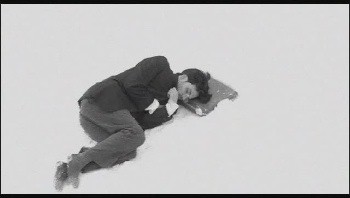
Well, at least it thinks it is. The brainchild of writers/directors Dave Mazzoni and Tom Mattera--who developed the original concept while film students at Temple University--The 4th Dimension is an arty effort that may remind you of early David Lynch in it's visual style and story complexity. Shot in black and white, the story unfolds in two arcs--a young Jack is tended to at home by his sick mother Amanda (Karen Peakes), and likes to confound his school teacher with intellectual musings. "There's no such thing as a true straight line...that is if you were dealing with space and time," he says. ""We live in a three-dimensional world, that not only has height and width, but also depth...everything is curved."
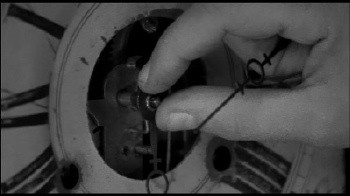 In the other story, an older Jack spends his time working at an antique shop, and shows signs of obsessive compulsive disorder with frequent hand washing--and a habit of collecting things. He soon gets a mysterious broken clock that consumes his thoughts--and contains journal entries from Albert Einstein about his unfinished Unified Field Theory: "The unification of electromagnetics and gravitation brings the possible explanation for many unexplainable questions that have haunted individuals throughout the duration of time."
In the other story, an older Jack spends his time working at an antique shop, and shows signs of obsessive compulsive disorder with frequent hand washing--and a habit of collecting things. He soon gets a mysterious broken clock that consumes his thoughts--and contains journal entries from Albert Einstein about his unfinished Unified Field Theory: "The unification of electromagnetics and gravitation brings the possible explanation for many unexplainable questions that have haunted individuals throughout the duration of time."
The two worlds--which take place in intentionally abstract eras in time--seem to intersect when old Jack sits on a train that rides past a school house with young Jack looking out the window. Are these dreams, or do two parallel worlds exist at the same time? Is the "line of time" in fact a series of dots, with the spaces in between traps that people can fall into, leading them to a potential new path and different life? "Time is measured from nothing but an imaginary clock," notes Jack. "You live in whatever time you want."
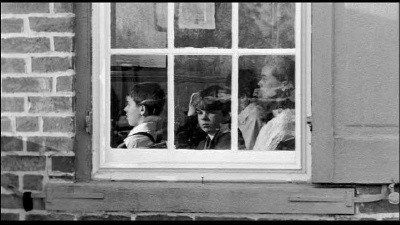
More mysteries arrive: What the heck is with that (initially unseen) woman who keeps asking Jack if he's going to "fix it"? "You know why I'm here," she warns. "You know I could get you into a lot of trouble...why aren't you working on it?" There's also a shady figure in a top hat that may be a nightmare--or an evil specter overlooking Jack. The entire plot gets a tad more frustrating as the story unfolds, and try as hard as you might to unravel it, you get the sense that easy answers aren't coming.
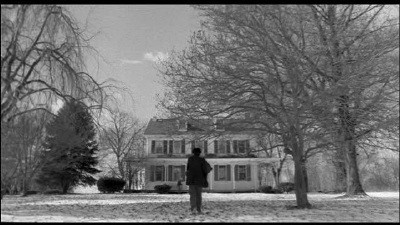
But you'd be wrong...because just when you've lost interest, there comes the conclusion, which spells things out for you. Literally. The directors hold your hand and write it out, then wrap it up with a pretty bow. All of that brain twisting, all the pretense, all of that promise of higher meaning was a complete sham, a waste of your time. You'll get mad at yourself for even attempting to think it through.
The conclusion is a huge disappointment, a copout you've seen before. It's an ending you might have considered but dismissed, thinking it couldn't possibly be that simple. And it's not like the mystery you had to work with was all that great--there are far too many sequences where nothing happens: you're just staring at people staring at each other...or the wall (you get frustrated, and then you just get bored).
This might have worked as a 30-minute short with more focus, some elements ditched and others explored more. It's clear that Mazzoni, Mattera and the crew have talent. I loved the look here--director of photography Daniel Watchulonis and production designer Nathan Kalushner have done a fantastic job (on a very small budget) of creating a cold, bleak, lonely landscape with images and settings that beautifully create a haunting mood. There's promise here, but this is ultimately too frustrating an experience to sit through.
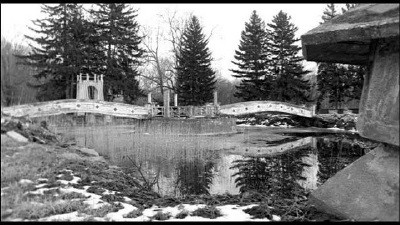
The DVD
Video:
Presented in non-anamorphic 1.85:1 widescreen, this is very low-budget video that has plenty of problems--but to be fair, it's supposed to be. There's excessive grain, film specks, some lighting issues where parts of the image get washed out, and some ghosting problems. It's almost like watching a movie filmed in a fog. There were also a few instances where some images seemed to be pulsing on the screen, which I thought might have been intentional--but now I'm thinking no. But despite all of those challenges, it still works for the film's intent.
Audio:
The 5.1 and 2.0 surround options also have issues. You'll never have a problem hearing anything or following the story, but it's clear that a lot of this film was shot with no sound, with effects added in later. The dialogue--which was shot with sound--is noticeably separated from the rest of the track. It's like you hear a white noise that accompanies the dialogue, but as soon as someone stops talking, you hear a shift in the sound, a sudden quiet that can be mildly annoying. It becomes too apparent that this isn't one fluid track.
Extras:
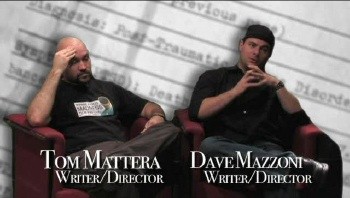 The film comes with two audio commentaries, both led by writers/directors Dave Mazzoni and Tom Mattera. They are joined by lead actor Louis Morabito in the first track, which is a laid-back, laugh-filled experience where they all reminisce about the experience and try to stay away from too much technical stuff. The second track features director of photography Daniel Watchulonis in a slightly more formal chat with a lot more technical details on the filming process. There's slight repetition in the two tracks, and Mazzoni/Mattera don't sound quite as jazzed up in the second one. But it's still interesting to hear about their intent and some of their decisions (an earlier version had an additional 45 minutes...yikes!). They talk about how one of the opening shots (in the house) was meant to help establish the behavior of the camera (and the movie) with a voyeuristic approach, creating the feeling that there's a supernatural presence that surrounds and watches Jack, resulting in a dreamlike effect.
The film comes with two audio commentaries, both led by writers/directors Dave Mazzoni and Tom Mattera. They are joined by lead actor Louis Morabito in the first track, which is a laid-back, laugh-filled experience where they all reminisce about the experience and try to stay away from too much technical stuff. The second track features director of photography Daniel Watchulonis in a slightly more formal chat with a lot more technical details on the filming process. There's slight repetition in the two tracks, and Mazzoni/Mattera don't sound quite as jazzed up in the second one. But it's still interesting to hear about their intent and some of their decisions (an earlier version had an additional 45 minutes...yikes!). They talk about how one of the opening shots (in the house) was meant to help establish the behavior of the camera (and the movie) with a voyeuristic approach, creating the feeling that there's a supernatural presence that surrounds and watches Jack, resulting in a dreamlike effect.
Next up is "The Making of The 4th Dimension" behind the scenes featurette (17:00), with a lot of the cast and crew. It goes over the evolution of the work, and spends a lot of time talking about an inspiration for the story--one that surfaces in the conclusion. It's actually very interesting, a mini-documentary on an interesting subject. Maybe it should have been a bigger focus in the actual film.
You also get five deleted scenes (9:27) with optional commentary. None of them are too interesting--although one used an image I wish was explored more. Rounding out the set is the theatrical trailer.
Final Thoughts:
This low-budget, black-and-white excursion has arty intellectual intentions--but can't deliver on them. There's a lot of promise in this mind-bender wannabe, but it's a missed opportunity due to too much dead time and an immensely annoying, unsatisfying ending. Skip It.
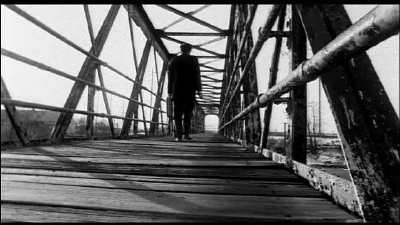
|
| Popular Reviews |
| Sponsored Links |
|
|
| Sponsored Links |
|
|
| Release List | Reviews | Shop | Newsletter | Forum | DVD Giveaways | Blu-Ray | Advertise |
|
Copyright 2024 DVDTalk.com All Rights Reserved. Legal Info, Privacy Policy, Terms of Use,
Manage Preferences,
Your Privacy Choices | |||||||









